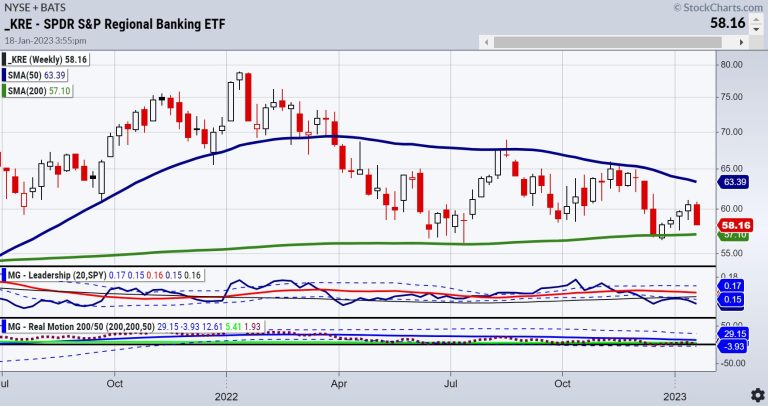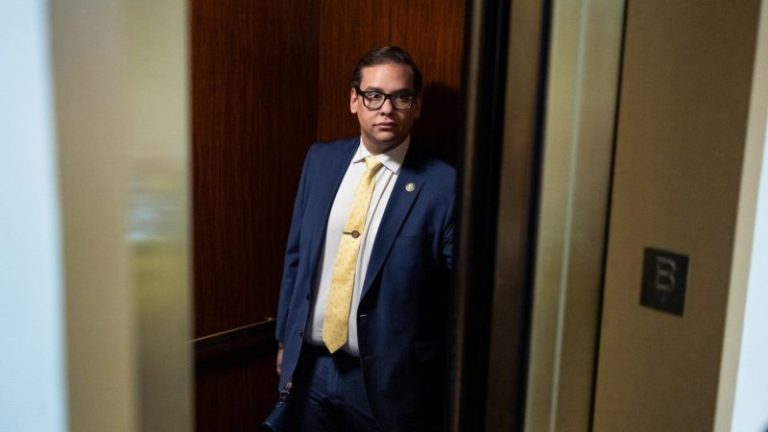KRE Regional Banks is a member of my Economic Modern Family. With bank earnings in gear, this ETF measures the smaller banks–the ones where people living in more rural communities and smaller cities often go to borrow and save money.
Here is a passage from March 22, 2022:
“We have and continue to use Mish’s Economic Modern Family to successfully navigate through the pandemic and now, in 2022, we use its insights to guide us through a year that has three main overhead pressures: geopolitical stress from the current Russian/Ukraine war, inflation, and, finally, rising interest rates.”
I quote that passage as just one week later marked the high point of the S&P 500. And we all know what happened from there.
So, here we are in 2023, and the enthusiasm for a bottom remains high. Calls for a Fed pivot are relentless. Yet, like March 22, 2022, the Russia/Ukraine war persists, inflation (although cooled in some areas) forges on, and rising interest rates… well the FED has said nothing about a pivot.
By the way, deJa’Vu all over again, the U.S. has a debt ceiling emergency in the midst.
I remember 2011. The political battle to delay the inevitable–raise the ceiling and print more money. Until everyone played nice, the market fell 20%. That makes me wonder, is this why KRE has lagged and lives so dangerously close to a weekly chart breakdown?
First, the 6-month calendar range. The January high in KRE is 61.08 or just under the 50-daily moving average. The 6-month low is 57.50, precisely on the 200-week moving average. We are loving the calendar range this year because of how well it lines up with major moving averages.
So, now KRE sits about midpoint of the range. A move under 57.50 and, regardless of what the other members are doing, we will take that as fair warning. A move above 61.10, and we take that as a good sign and continue shopping. However, this mid-range chop can wreak havoc, so tread lightly with some patience until the range reconciles.
And, remember–always best to look at the weakest link in the family as well as the strongest member. KRE is the weakest.
So, we ask, temporary malaise, or contagious, with further illness on the horizon?
Mish’s Picks are already up 10-20% outperforming the SPY!
Want to take advantage of her stellar track record and ensure a profitable trading year? For more detailed trading information, contact Rob Quinn, our Chief Strategy Consultant, to learn more about Mish’s Premium trading service.
You don’t want to miss Mish’s 2023 Market Outlook, E-available now!
Click here if you’d like a complimentary copy of Mish’s 2023 Market Outlook E-Book in your inbox.
“I grew my money tree and so can you!” – Mish Schneider
Get your copy of Plant Your Money Tree: A Guide to Growing Your Wealth and a special bonus here.
Follow Mish on Twitter @marketminute for stock picks and more. Follow Mish on Instagram (mishschneider) for daily morning videos. To see updated media clips, click here.
Mish in the Media
See Mish tonight on CNBC Asia, and tomorrow on Making Money with Charles Payne!
In StockCharts TV’s Charting Forward 2023, Mish sits down with a round table panel of experts for an open discussion about the things they are seeing in, and hearing about, the markets.
Mish presents her 2023 Outlook and gives you 6 trading ideas from Macro to Micro on the Thursday, January 12 edition of StockCharts TV’s Your Daily Five.
Mish and John discuss how equities and commodities can rally together, up to a point, in this appearance on Bloomberg BNN.
Mish and the team discuss her outlook and why inflation will persist, with a focus on gold, in this appearance on Benzinga.
While the weekly charts still say bear market rally, Mish and and host Dave Keller discuss the promise of the daily charts on the Tuesday, January 10 edition of The Final Bar (full video here).
In this appearance on Business First AM, Mish discusses the worldwide inflation worries.
ETF Summary
S&P 500 (SPY): January calendar range reset day 1; SPY fails the 200 and 50-DMA.Russell 2000 (IWM): In better shape than SPY, but still a nasty reversal and must hold 180.Dow (DIA): Back under the 50-DMA as industrials lose ground.Nasdaq (QQQ): Sitting just under the 50-DMA-and never cleared the 200-WMA.Regional Banks (KRE): Led the way down and now must hold 57.50.Semiconductors (SMH): Still holding key support at the 50-WMA, so we shall see.Transportation (IYT): 225 key support here.Biotechnology (IBB): Still best sector with 132 key support.Retail (XRT): 63 the 200-WMA if market good must hold.
Mish Schneider
MarketGauge.com
Director of Trading Research and Education









